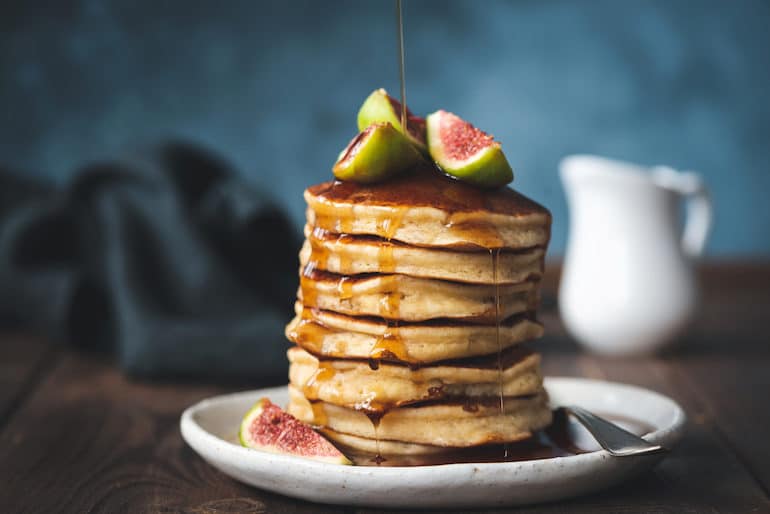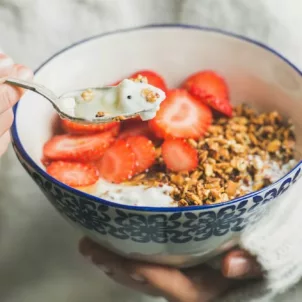Best and Worst Artificial Sweeteners, According to an RD
Which sweeteners are best to use and what to avoid? Here to give you the definitive guide to the best and worst sweeteners for your health is former HUM Nutritionist Jessica Bippen, MS, RD. From maple syrup, to dates, and stevia, we break down the best. Plus, the worst in sweeteners including the artificial kind. This guide will help you make informed decisions for your health, daily.
The Role of Sweeteners and Their Impact on Health in Modern Day Times
If you have a killer sweet tooth, you’ve come to the right place to learn more about it. The reality is that you may crave sugar because you have so much sugar in your diet. The USDA estimates that the average American consumes over seven tablespoons of added sugars per day. This excessive sugar intake links to higher calorie consumption and lower diet quality. In turn, this leads to an increased risk of weight gain and other more serious medical conditions.
But even with these facts, most of us aren’t going to cut it out of our lives completely. As a result, people are now at least looking for healthier alternatives. So it’s no surprise that companies are jumping on the opportunity by providing plenty of options. But are any of these sugar substitutes actually healthy? Which sweetener is best, and what are the sweeteners to avoid? Keep reading to find out more.
Best & Worst Artificial Sweeteners
We’ve listed out the best and worst sweeteners for you below so that you have an easy go-to list to reference. And later in this article we break down each sweetener and why it is beneficial or detrimental to your health.
Best:
- Honey
- Maple syrup
- Dates
- Coconut Sugar
- Stevia
- Monk Fruit
Worst:
- Brown rice syrup
- Agave
- High-fructose corn syrup
- Artificial Sweeteners
What Are the Best and Worst Sweeteners?
Dates, honey maple syrup, and coconut sugar are your best sugar alternatives. The occasional use of stevia and monk fruit are also good options. The worst sweeteners include artificial sweeteners like sucralose, saccharin, and aspartame, high fructose corn syrup, agave, and brown rice syrup. It’s best to avoid these sweeteners, if possible.
Let’s further discuss some natural and artificial sweeteners, ranked.
The Best Sweeteners & Sugar Substitutes

Honey
This thick, sweet golden liquid is made by bees from flowering plants. Honey is one of the best alternatives to refined sugar. While it’s comprised of mostly glucose and fructose molecules, raw, unpasteurized honey contains trace amounts of B vitamins and minerals like iron, manganese, and potassium.
The biggest health benefit of raw, unpasteurized honey comes from its antioxidant and antimicrobial properties. Honey also tastes slightly sweeter than regular sugar, meaning you can use less while still achieving the same sweet taste.
Maple Syrup
Maple is a sticky syrup that comes from boiling down the sap from maple trees. It ranges in colors from golden to amber based on the time of the season the sap was extracted from the maple trees. Maple syrup is a great alternative sweetener thanks to its antioxidants and trace amount of nutrients like manganese and zinc.
Dates
These soft and chewy fruits are nature’s candy! Dates are a good source of fiber, potassium, calcium, and antioxidants. A 2009 study of 12 different sweeteners found that date sugar has the highest antioxidant content. 2020 research confirmed that dates are high in anthocyanins, a pigment found in dark berries and fruit that’s chock full of antioxidants. This nutrient profile makes whole dates a great option to satisfy a sweet tooth.
Dates also make a terrific alternative for refined sugar in sauces and desserts. You can easily blend whole dates into a batter or liquid. Companies make this process even easier by selling date paste, date syrup, and date sugar (which is made from dehydrated and ground dates). Since these options still have the same nutrients found in whole dates it makes for a very healthy sugar alternative.
Coconut Sugar
This trendy tropical sweetener is made by broiling down and dehydrating the sap of coconut palm flowers. While it goes through processing, it’s less refined than regular refined sugar. Coconut sugar also has a lower glycemic index than table sugar. Furthermore, it contains trace amounts of minerals and naturally occurring inulin, which acts as a fiber. Since coconut sugar can replace brown sugar at a one-to-one ratio in recipes, it’s easy to use in baking to make your treats slightly healthier.
Stevia
In 2008, stevia won FDA approval for use as a safe sweetener for foods and drinks. Stevia comes as a powder or liquid via the stevia plant, which is native to South America. Stevia is actually about 100-to-300 times sweeter than sugar. It contains no calories and doesn’t impact blood sugar like refined white sugar. This means you can use much less of it or combine it with other sweeteners to reduce calories. Keeping that in mind, stevia can have a distinct, slightly metallic taste, which can be off-putting to some.
Monk Fruit
Also known as Luo Han Guo, monk fruit is gaining popularity as a non-caloric, natural sweetener. Monk fruit extract comes from a sweet melon grown in Southeast Asia and is used as a traditional herbal remedy in China for coughing and sore throats, as a longevity aid, and as a sweetener.
Like stevia, monk fruit is about 200 times sweeter than table sugar. One benefit of monk fruit is it lacks the bitter aftertaste associated with stevia. This makes it more appealing for many consumers looking for a low-calorie option that won’t spike blood sugar.
Preliminary research also shows that monk fruit contains antioxidants that in turn could support the immune system, digestive tract, and respiratory system. In terms of safety, The FDA has also declared monk fruit extract as safe.

The Worst Sweeteners & Sugar Substitutes
Brown rice syrup
Brown rice syrup is a popular option among the anti-fructose crowd and vegans as a replacement for honey. It’s made from brown rice treated with enzymes to break down the starches. The result is a thick, golden liquid that is slightly less sweet than sugar. Brown rice syrup is low in fructose, meaning there is less stress placed on the liver.
The one downside of this sweetener is that it comes from brown rice, which may contain high levels of arsenic. Because brown rice can efficiently absorb arsenic from the surrounding environment, it’s best to avoid this sweetener if you’re watching your heavy metal intake.
Agave
Many people deem this recently popular sweetener as healthy, but it’s not exactly the case—it’s better categorized as one of the bad sugar substitutes. Agave syrup is made from the agave plant, which is also used to make tequila. However, agave is more processed than people realize. First, the process begins with extracting and filtering the agave juice. Then, it’s heated and hydrolyzed into syrup. In fact, this process is very similar to manufacturing high-fructose corn syrup.
Proponents of agave tout it for its low-glycemic index. It also has a trace amount of minerals like iron, calcium, potassium, and magnesium, as well as a neutral taste. Agave is one-and-a-half times sweeter than sugar, so you don’t need to use as much to achieve the same level of sweetness.
Still, despite these slight advantages, it also contains one-and-a-half times more calories than refined white sugar and much more fructose. While most sweeteners have a roughly 50/50 mix of glucose to fructose, agave is actually 90 percent fructose! This is important because consuming too much fructose may increase the risk of abdominal fat and numerous health problems.
Initially, researchers thought agave was a good option because fructose doesn’t spike blood sugar. However, the liver metabolizes fructose, and when it receives excessive amounts, it transforms it into triglycerides. This type of fat can increase the risk of numerous health problems, including fatty liver disease and weight gain.
High-Fructose Corn Syrup
Manufacturers add this cheap sweetener into nearly everything. Next time you’re at the grocery store, look at the mainstream barbecue sauces or peanut butter. You’ll surely find a few with high-fructose corn syrup as an ingredient.
The making of high-fructose corn syrup includes converting corn starches to liquid sugar. In this process, some of the glucose in corn syrup converts to fructose. This makes it sweeter, which means manufacturers can use less, and is thus huge for companies trying to cut costs. The fructose level in high fructose corn syrup ranges from 55-to-90 percent. In addition, almost all high-fructose corn syrup uses genetically modified corn and is considered an unhealthy sugar substitute.
Artificial Sweeteners
The absolute worst sweeteners are artificial sweeteners, such as sucralose, saccharin, and aspartame. These are the worst sugar substitutes because these sweeteners are manufactured in a lab, meaning they’re not found in nature. While research considers them “generally regarded as safe,” inconclusive research shows evidence suggesting they’re not a healthy option and can even promote weight gain in the long run.
Sucralose, aka Splenda, is 600 times sweeter than table sugar, therefore making it one of the worst artificial sweeteners. It’s marketed as a “no-calorie” option since it meets the FDA standards of less than five calories per serving.
Saccharin, commonly known as Sweet ‘N Low, is about 300 to 500 times sweeter than table sugar. The biggest drawback is an unpleasant aftertaste. Back in the 1970s, the FDA proposed saccharin be taken off the market after citing studies that linked the consumption of the sweetener with cancer in lab animals. However, the proposal failed with the no conclusive that it causes cancer in humans.
Aspartame, also known as NutraSweet or Equal, is one of the most popular sweeteners. Two amino acids compose aspartame, phenylalanine, and aspartate. Unlike other artificial sweeteners, aspartame contains four calories per gram in the form of amino acids. However, it’s 200 times sweeter than table sugar, so you can use significantly less. Like with the other artificial sweeteners, the FDA regards aspartame as safe to consume in the amounts that people typically eat or drink. However, many researchers and health professionals aren’t convinced.
Xylitol is another sugar alcohol that’s technically an artificial sweetener and is somewhere in between the best and worst artificial sweeteners. You might find it in sugar-free and keto products like gums, drink powders, sauces, and condiments. You can find trace amounts of it in some fruits and veggies, including raspberries, mushrooms, and cauliflower, and it’s well-tolerated by most people. But if you’re sensitive to FODMAPs, it may bother you and trigger digestive issues in large amounts.
One more sugar alcohol you should be aware of is erythritol. It’s a sugar-free sweetener that’s similar to stevia and commonly used in keto recipes. Erythritol is low in calories, does taste like sugar, and is safe to consume. Again, if you’re sensitive to FODMAPs, it might add to digestive distress.
All in all, many people report headaches, stomach aches, and a general ill feeling after eating artificial sweeteners. Newer research shows that artificial sweeteners can alter the good bacteria in your microbiome, throwing your entire gut health out of whack. (Read more about artificial sweeteners and gut health to get the scoop.)
What About Refined Cane Sugar?
We often refer to refined sugar as empty calories. It’s 100 percent carbohydrates and contains no vitamins, minerals, or other nutrients. Refined sugar includes cane sugar, confectioner’s sugar, and brown sugar.
That being said, there are worse sweeteners than refined sugar. When you have the option, choosing one of the less refined options like honey, maple syrup, and dates is a better choice. However, it can be more challenging to use some of the healthier options without changing the taste and texture of the food you’re trying to make.
If you’re going for a classic taste and texture, try reducing the amount of sugar in the recipe. Often, you can get away with cutting the sugar by a third without noticing much of a difference. Then, if reducing the amount of sugar in the total recipe isn’t possible, you can always reduce the portion size per serving. Make cookies smaller or perhaps just make half a batch. This way, you’re consuming less sugar in general.
How to Choose the Right Sweetener for Your Diet
Depending on your health goals, it is important to keep your diet as clean as possible, starting with the most natural and healthy of sugar choices.
Take a look through our suggested best sweeteners (above in this article) to help you decide which one may be best for you.
Sweeteners for Specific Health Goals
Health Goals: You may have considerations like diabetes or want to watch your GI intake. Make sure to be clear on your goals to inform next steps on what sweetener to use and how much.
Serving Size: Being conscious of how much you consume is important. Governing your sugar intake so that it’s not too much can help mitigate blood sugar issues and weight management.
The Bottom line
When it comes down to it, sugar (natural or refined) is still sugar. My best advice is to reduce your sugar consumption in general. The less sugar or alternative sweeteners you use, the better it is for your overall health.
All this being said, it’s important to not fear foods. Treating yourself to ice cream on occasion or your grandma’s apple pie isn’t going to derail your health. After all, part of overall health is enjoyment! It’s best to avoid the top-ranked worst sugars in your daily diet, but if you happen to have a warm, fresh-out-of-the-oven chocolate chip cookie made with refined white sugar once in a while, don’t sweat it!
Interested in cutting sweeteners completely? Two brave HUM employees tried removing all of the sweeteners above for thirty days. See the results of our no sugar and sweetener challenge here.










